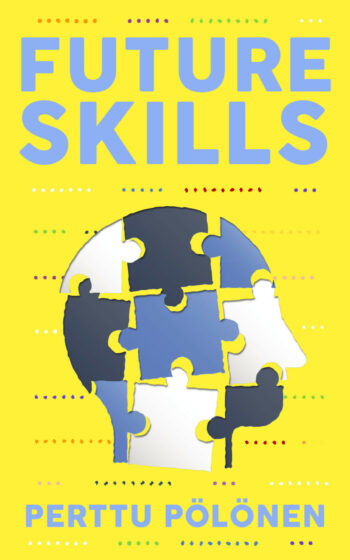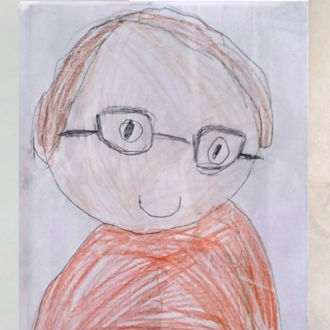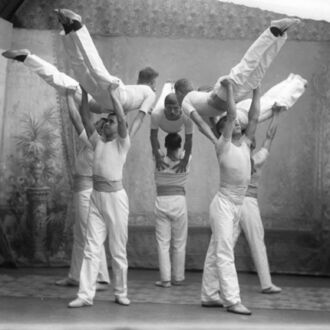At the time of our interview, Perttu Pölönen had just returned from the Eurasian Media Forum in Kazakhstan, where he had taken part in a panel discussion about the future of the labour and education markets. He gives hundreds of speeches every year to audiences at home and abroad.
“Tomorrow I am travelling to Austria to give a keynote about future skills in the EuroSkills competition,” he says. “It is wonderful, since I believe in cooperation and networking.”
Technology helps us stay globally connected, but it also has changed the way we look at our own skills and our children’s education. Pölönen’s vision and insights can help us understand the technologically driven working life of the future.
Skills more important than job titles

“To counterbalance digital development, humanity must not be forgotten,” says Perttu Pölönen. “In the future, human skills will be appreciated even more than today.”Photo: Vilja Harala
Pölönen encourages us to build our professional identity around the skills we have, instead of a named profession.
“Instead of telling others your job title, tell them what you can bring to the community,” he says. “Describe your identity: Who are you? An educator, perhaps, or a mediator, campaigner, problem solver, unifier or collaborator? Think about the needs of the community and the feelings you bring to it. This way you are not limited to one profession, but start seeing many professional options as the world around us keeps changing fast. Skills are more important than job titles.”
He has built a remarkable career for someone who is only in his late 20s. How would he describe his own skills?
“I see myself as someone who brings colour, adds spice and clarifies the topic at hand,” he says. “I seek information and recognise ideas that I can expand together with others. I can clarify connections between issues. I also hope I can help others by working according to my values.”
Work life in the near future

Perttu Pölönen spoke to young people at a Campfire Summit about leadership, organised by the Scouts of Finland.Photo: Mari Lehtisalo
If we continue along the path we are on now, working life will become increasingly polarised.
“In the future, there will be more low- and high-wage sectors than today,” says Pölönen. “The employment market will become more global. There will be more microentrepreneurs, and one person will have multiple work identities. I believe that, in the future, everyone will have to take more responsibility for their own work and presenting their skills.”
What about salary? Surely it will still be important?
“It will, but the growth of general wealth and the acute need for sustainable lifestyles will reduce the importance of money in wellbeing states,” he says. “There is less need for continuous growth when it does not meet real needs. I believe people will also come to see the value of their leisure time.”
The human factor in the digital age
In this TEDx Talk video, Perttu Pölönen asks, “What can I get from you that I cannot get from Google?”Video: TEDx Talks
Technology will have a huge impact on working life in the future.
“The internet will support equality when everyone in the world has access to it, but we are not there yet,” says Pölönen. “It is vital to get versatile teams to develop technology, so that everyone can use it and it meets everybody’s needs. Technological development is too important to be left to a small and homogenous group of engineers.”
While artificial intelligence and robotics are changing the way we look at work, there are still some core skills that only humans possess.
“To counterbalance digital development, humanity must not be forgotten. On the contrary, in the future human skills will be appreciated even more than today.”
Amidst the third industrial revolution, it is time to think about what we humans can bring to the workplace.
“Can AI replace teachers?” he asks. “Technology can help the teacher realise, for example, what is difficult for children and what they already understand. However, a teacher can take the needs of a child into account in a way that a robot cannot. Teachers can read the child’s body language and show emotions like interest and caring. Humans can recognise an optimal moment to teach something. Humans have sensitivity and emotional intelligence that technology lacks.”
The importance of education

The book Future Skills asks, “Which skills should we be cultivating in an age of ceaseless technological progress?”Photo: Viva Editions
In the future, the most valuable skills may not be easily discernible based on the applicant’s qualifications.
“How do you prove you are good at creative problem-solving, or that you have a great sense of humour?” Pölönen says. “These human qualities are difficult features to measure, but they are features that only humans can bring to working life.”
He himself studied music composition at the esteemed Sibelius Academy in Helsinki, but after graduating he realised that he wanted to do many other things as well. He studied future technologies with the Singularity Education Group in Silicon Valley. From there he went to Myanmar and started an edtech company.
“Education remains very important, but the focus should be on skills, not on diplomas,” he says.
“Studying gives you skills you can use in many professions, like project management, communication and critical thinking. I am a strong supporter of interdisciplinary teams, because the issues we need to solve today are very complex. We cannot afford to look at them from a limited perspective.”
Instead of focusing on degrees, Pölönen emphasises constant, lifelong learning.
“The internet is full of learning material that is easily accessible, often free, and constantly updated.”
Currently the world needs people who have the skills to imagine our future.
“Futurology helps us remain conscious of our choices and the direction we are going,” says Pölönen. “It helps us make the world a better place, since the future is the product of our concrete actions. Instead of proceeding as fast as possible, we must see what is relevant for the future.”
Inventor of the MusiClock
Perttu Pölönen (born in 1995) is a futurist, inventor and author. He studied future technologies at the Singularity Education Group, based in Silicon Valley, and cofounded an edtech company in Myanmar. He once won the EU’s Competition for Young Scientists. In 2018, MIT Technology Review included him in its list of 35 Innovators Under 35 in Europe.
Pölönen invented the MusiClock, which helps music students learn scales, chords and intervals. He has turned his invention into a product and an application that are now in use all around the world.
Books by Perttu Pölönen: Future skills (Viva Editions, 2021; original Finnish title: Tulevaisuuden lukujärjestys) and Tulevaisuuden identiteetit (Future Identities, available in Finnish only; Otava, 2021).
By Päivi Brink and Susanna Bell, ThisisFINLAND Magazine 2022












